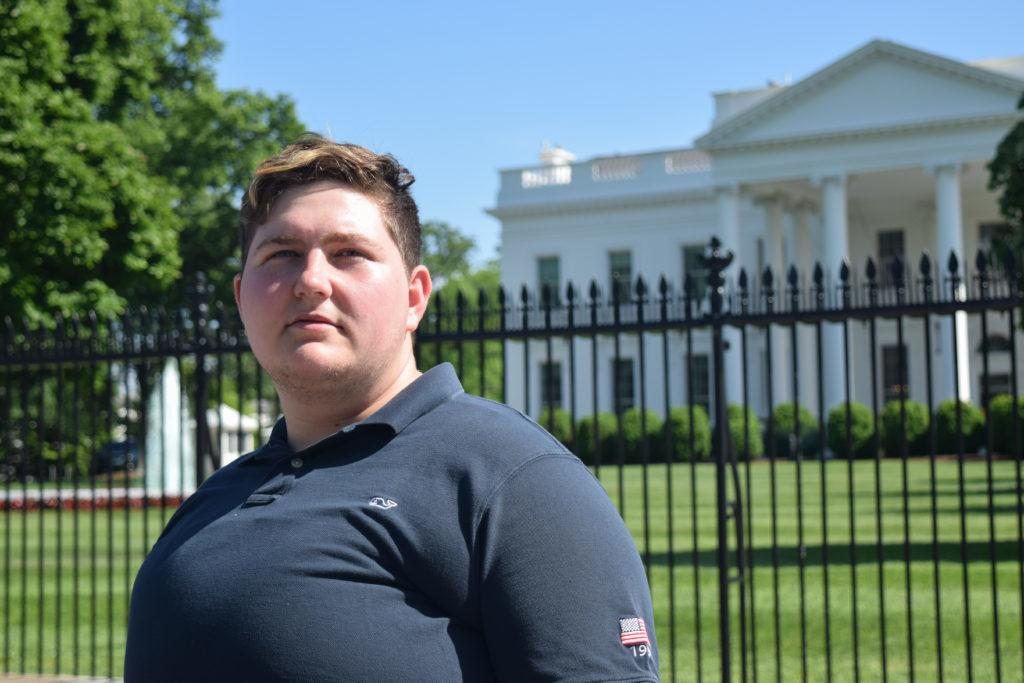For freshman Henry Brousseau, a trip to a Trump campaign rally last year turned into a lawsuit against the president of the United States.
Brousseau – and two other protesters – filed a lawsuit against President Donald Trump in March 2016 after he was allegedly punched by two Trump supporters while protesting at a rally in Louisville, Ky. Brousseau said Trump egged on the alleged assaulters by encouraging the crowd to turn against the demonstrators.
The case, which was moved to Federal District Court, made national headlines and has even drawn a response from Trump’s legal team, which has argued that Trump cannot be sued as sitting president.
As a senior in high school, Brousseau attended Trump’s rally with the activist group Showing Up for Racial Justice to protest then-candidate Trump and his speech.
As Trump was speaking, Brousseau unfurled a sign reading “People over Profit,” after which he was punched by several men from the Traditional Worker Party, a Neo-Nazi group, and other rally-goers, according to court documents.
“We started to protest during the speech and I had a sign ripped away from me, and while they were ripping it away from me someone from the Neo-Nazi group punched me in the stomach,” Brousseau said.
He filed suit against Trump in Jefferson Circuit Court in Kentucky later that month, alleging that Trump had incited violence – an illegal act – by encouraging his supporters to forcibly remove Brousseau and his fellow activists from the event.
“We decided to file because during all of this, Donald Trump started yelling ‘get ‘em out of here, get ‘em out of here,’ making it very clear that his intent was for the audience to remove us, not security and not the police,” Brousseau said.
Kashiya Nwanguma, one of the activists with Brousseau who also filed the suit, took video of the incident in which Trump is heard demanding the protesters leave.
“Get out,” Trump said in the video. “You know in the old days, which wasn’t so long ago, we didn’t have to be so nice.”
Brousseau said Trump’s actions at the rally violated his rights as a U.S. citizen.
“This is America, we have a set of traditions and beliefs, and we’re fundamentally founded on the belief that you’re allowed to have opinions that people won’t necessarily agree with,” he said.
Brousseau said the case is still in its early stages and his legal team is still collecting evidence. The next hearing in the case is scheduled for May 18.
The activists are suing Trump and his presidential campaign for emotional distress, mental anguish, humiliation and physical injuries. The suit also seeks damages from the men who allegedly assaulted Brousseau and the other protesters, Nwanguma and Molly Shah.
In response to Brousseau’s lawsuit, Trump’s lawyers argued he was not encouraging his supporters to assault the protesters and that the lawsuit violated Trump’s First Amendment right to free speech.
His lawyers asked that the case be dismissed but a judge denied this request last month.
Trump’s lawyers filed a response to the judge’s ruling April 14 arguing that, as president, he is immune from civil lawsuits.
John Banzhaf, a law professor at GW, said Brousseau and the other plaintiffs have a “moderate” chance of winning their lawsuit, as it has been deemed valid by a judge, but there are questions about the accuracy of the allegations.
Banzhaf said the plaintiffs’ accusations of incitement to riot, vicarious liability and negligence aren’t convincing.
“To me it’s much more clearly an intentional act rather than a negligent act, because if you simply say ‘did he do an act intending to cause bodily harm to somebody else?’ that’s simple,” Banzhaf said.
Banzhaf said the court would have to determine if Trump’s words presented a clear and present danger of immediate harm – the legal standard used to determine incitement of violence. So far the court has agreed in the proceedings that Trump’s words were believable and therefore are not protected by the First Amendment, he said.
Banzhaf added that Trump’s lawyers claim that he is immune to the lawsuit is not valid because of the precedent set by former President Bill Clinton’s case of sexual impropriety.
“To use a legal term, that’s just crap,” Banzhaf said.
Michael Shapiro, a law professor from the University of Southern California, said Trump wasn’t automatically excused from being sued.
“No one has a First Amendment right to avoid such criminal or civil liability for shutting down someone else’s speech,” Shapiro said. “The question is to what extent a speaker may take action to preserve his or her right to speak.”




